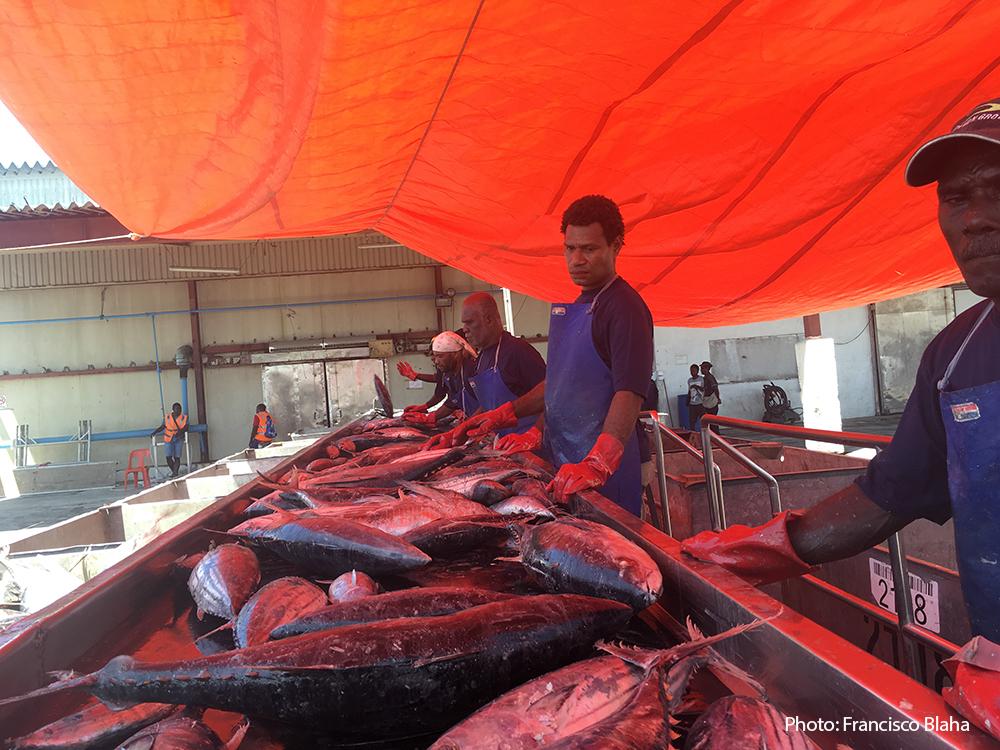Size selection of tuna during unload. Photo: Francisco Blaha
‘Over the last 50 years, FAME has contributed to a significant increase in employment in the tuna fisheries sector.’
A plate of sashimi that sells for USD 300 in a high-end restaurant in Japan can mean families and entire communities in remote Pacific Island nations thousands of miles away are able to put food on the table. It can also translate to better infrastructure, better schools for our children, and better health facilities for our people.
Tuna, ‘the gold of the ocean’, is now a major contributor to the global economy and has become the primary source of government revenue for many Pacific Island economies. In some countries, such as Kiribati and Tuvalu, people’s livelihoods hinge on revenue from one of the oceans most valuable resources.
A study commissioned by the Pacific Community (SPC) and the Australian Government in 2016 – Fisheries in the Economies of Pacific Island Countries and Territories – provided a clear picture about how tuna (and other fisheries activity) contributes to Pacific economies. It is estimated that the tuna industry amounts to USD 3.2 billion in the region.
For decades, the revenue from tuna went to foreign countries whose fleets fished in Pacific waters and sailed away with the
spoils, and not much, if any of the money translated into economic benefits for Pacific peoples. However, things have changed
over the past half century, which would not have been possible without intervention at the highest levels. Mustering the political will to protect the tuna stocks in the Pacific was the major challenge to ensuring regional collaboration and cooperation, and SPC has been at the forefront of these efforts.
SPC provides advice on sustainability and proper management of tuna stocks to its 22 Pacific Island country and territory (PICT) members. This advice is also shared with other partner agencies, such as the Forum Fisheries Agency (FFA), which
works with individual member countries on fisheries-related projects. Tuna is a key source of government revenue for many
Pacific countries. In 2015, PICTs collectively earned around USD 450 million in revenue from foreign tuna fishing fleets licence fees, which allow them to fish within PICT maritime zones.
Over the years, SPC has worked with member states, donors and partners to improve the management of complex, large-scale
fisheries, and in particular the maintenance, monitoring and evaluation of tuna stocks. This has been made possible by collecting all information available from national governments and commercial fishing fleets on fishing activities in the region. Japanese fleets now join Korea, China, the USA and many others in providing all necessary data to enable SPC, FFA and relevant government agencies to monitor and assess all fishing activities in the Pacific.
SPC’s Fisheries, Aquaculture and Marine Ecosystems (FAME) Division also works with member states on sustainable investment projects in collaboration with communities to support job creation throughout the region.
Over the last 50 years, FAME has contributed to a significant increase in employment in the tuna fisheries sector – from approximately 13,500 jobs in 2011 to over 22,000 in 2015. This has been achieved through the settingup of shore-based tuna processing and canning facilities and promoting foreign investment to establish new tuna industries or strengthen and expand existing ones. Government investment in fishing fleets and joint ventures with private companies have also contributed to the increased employment in the tuna sector.
‘FAME’s work has led to the availability of upto-date information on the impact of fisheries, which is critical for governments and individual communities to make informed decisions about management of the sector. FAME has since set global s standards in the monitoring and assessment of tuna stocks in the Pacific’, said FAME Director, Mr Moses Amos.
In July 2016, through SPC’s support, Solomon Islands achieved Marine Stewardship Council (MSC) certification. The certification acknowledges that the Solomon Islands fishery will continue to be managed in a way that ensures healthy stocks, minimises environmental impacts, and promotes good management under the existing regulatory structure for the fishery. Fisheries that achieve this certification are in a better position to respond to the growing demand for certified sustainable sources of tuna.
‘It is important for all Pacific nations to know how much tuna live and migrate through their national boundaries. Without such data, foreign vessels would continue to reap the benefits, and our people will continue to be left behind in terms of economic growth and development’, added Mr Amos.
SPC continues to work with its members and partners to provide assistance in monitoring tuna fishing by foreign and local vessels in Pacific waters. In the long term, this will continue to provide invaluable information about the status, resilience and capacity of the regional tuna stocks.
"Mr Moses Amos", "SPC", "FAME Director" url="http://www.spc.int/fame/en"
‘FAME’s work has led to the availability of up-to-date information on the impact of fisheries, which is critical for governments and individual communities to make informed decisions about management of the sector. FAME
has since set global standards in the monitoring and assessment of tuna stocks in the Pacific.’
